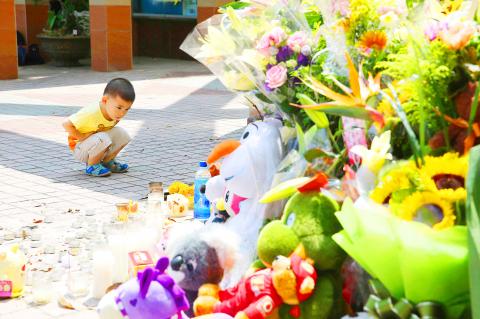President Ma Ying-jeou (馬英九) yesterday said the government cannot abolish capital punishment because society needs time to reach a consensus on the issue, according to Presidential Office spokesman Charles Chen (陳以信).
Chen’s remarks came after some observers interpreted a comment by Ma a day earlier as a sign that his administration might be considering abolishing the death penalty.
Asked about increased calls against ending the death penalty after an attack on an eight-year-old girl in a school bathroom in Taipei’s Beitou District (北投) on Friday, Ma said that two views he described as “opposing” have been debated for some time: Some people believe that capital punishment does not deter crime, while others believe that abolishing the death penalty would encourage crime.

Photo: CNA
“I think we better observe this for some more time,” Ma said.
Chen yesterday quoted Ma as saying that the government is unable to scrap capital punishment at the moment, but would continue to work toward reducing its application.
When meeting recently with a British parliamentary group in favor of the abolition of the death penalty, Ma said that the majority of Taiwanese are against ending capital punishment, Chen said.
The president also referred to a 2012 Ministry of Justice poll in which 76.7 percent of respondents opposed scrapping the death penalty, while more than 85 percent believe that abolishing the death penalty would affect public security, Chen said.
Meanwhile, the Democratic Progressive Party (DPP) said that further dialogue with those who advocate abolishing capital punishment is needed in the wake of the slaying of the second-grader.
Every child is the darling of their parents and the party was saddened by the tragedy, DPP spokesman Wang Min-sheng (王閔生) said, adding that all children should be able to study in an environment free from fear.
Complex and serious social problems were behind the killing, not just the issue of campus security, Wang said.
On the abolition of the death penalty, there are still deficiencies in the complementary measures of the current law, and also different views in society regarding the issue, he said.
“We need to have further dialogue and communication,” he said.
The suspect in the slaying, Kung Chung-an (龔重安), 29, reportedly said he was under great pressure and suffering from auditory hallucinations at the time of the incident.
His elder brother said Kung moved out of the family home five years ago.
He did not know how a previously normal person could turn into a killer, the brother added.

The Taiwanese passport ranked 33rd in a global listing of passports by convenience this month, rising three places from last month’s ranking, but matching its position in January last year. The Henley Passport Index, an international ranking of passports by the number of designations its holder can travel to without a visa, showed that the Taiwan passport enables holders to travel to 139 countries and territories without a visa. Singapore’s passport was ranked the most powerful with visa-free access to 192 destinations out of 227, according to the index published on Tuesday by UK-based migration investment consultancy firm Henley and Partners. Japan’s and

NATIONAL SECURITY THREAT: An official said that Guan Guan’s comments had gone beyond the threshold of free speech, as she advocated for the destruction of the ROC China-born media influencer Guan Guan’s (關關) residency permit has been revoked for repeatedly posting pro-China content that threatens national security, the National Immigration Agency said yesterday. Guan Guan has said many controversial things in her videos posted to Douyin (抖音), including “the red flag will soon be painted all over Taiwan” and “Taiwan is an inseparable part of China,” while expressing hope for expedited “reunification.” The agency received multiple reports alleging that Guan Guan had advocated for armed reunification last year. After investigating, the agency last month issued a notice requiring her to appear and account for her actions. Guan Guan appeared as required,

Japan and the Philippines yesterday signed a defense pact that would allow the tax-free provision of ammunition, fuel, food and other necessities when their forces stage joint training to boost deterrence against China’s growing aggression in the region and to bolster their preparation for natural disasters. Japan has faced increasing political, trade and security tensions with China, which was angered by Japanese Prime Minister Sanae Takaichi’s remark that a Chinese attack on Taiwan would be a survival-threatening situation for Japan, triggering a military response. Japan and the Philippines have also had separate territorial conflicts with Beijing in the East and South China

A strong cold air mass is expected to arrive tonight, bringing a change in weather and a drop in temperature, the Central Weather Administration (CWA) said. The coldest time would be early on Thursday morning, with temperatures in some areas dipping as low as 8°C, it said. Daytime highs yesterday were 22°C to 24°C in northern and eastern Taiwan, and about 25°C to 28°C in the central and southern regions, it said. However, nighttime lows would dip to about 15°C to 16°C in central and northern Taiwan as well as the northeast, and 17°C to 19°C elsewhere, it said. Tropical Storm Nokaen, currently